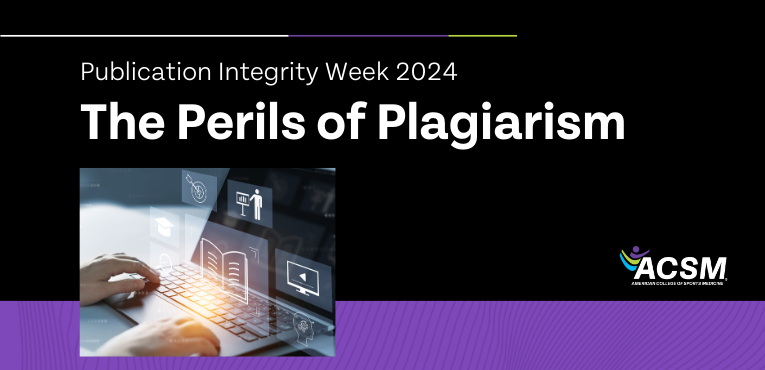Karyn L. Hamilton, RD, PhD, FACSM |
Nov.
18, 2024

Plagiarism, the act of presenting someone else's work or ideas as your own, is unfortunately a pervasive concern in academic publishing. It undermines professional integrity, stifles creativity, tarnishes reputations, and threatens innovation.
One of the many dangers of plagiarism is the erosion of trust. In academia, students who plagiarize risk failing assignments or even full courses, facing disciplinary action, and marring their credibility as future professionals. The erosion of trust can have long-term effects on both educational and career trajectories. Of course, plagiarism can also result in the misattribution of credit for ideas and discoveries, again impacting career trajectories.
In professional settings, plagiarism can lead to legal repercussions, career termination, and even result in damage to an institution’s reputation that is difficult to mend.
Plagiarism stifles originality and innovation, acting as a barrier to the development of new viewpoints and voices. It hampers personal growth and limits discovery and the advancement of knowledge. A secondary danger of plagiarism is the risk of perpetuating misinformation. Simply reproducing the thoughts of others without thinking critically about the content may inadvertently proliferate inaccuracies or outdated information, again undermining the very advancement of knowledge that is the goal of academic publishing.
Another threat brought about by plagiarism is a sense of complacency. Cutting corners rather than investing the care required to communicate original thoughts, ideas, and discoveries risks creating a culture where mediocrity is tolerated.
As part of the submission and peer review process for our scientific journals, ACSM is leveraging advanced tools to help ensure the originality of works under consideration for publication in one of the six scholarly journals. Working with ACSM publishing partner Wolters Kluwer, the ACSM Editorial Services Office staff and journal editors implemented the Crossref Similarity Check tool (powered by iThenticate) across the ACSM journal portfolio. This plagiarism checking tool allows journal staff and editors to provide an additional preventative measure against plagiarism.
We have also brought on board our first Science Integrity Editor, Dr. Jeffrey Potteiger. Serving in this position, Dr. Potteiger worked with Dr. Andy Jones, the Editor-In-Chief of Medicine & Science in Sports & Exercise® (MSSE), to establish the procedures for responding to allegations of misconduct in research, scholarship and scientific activities for manuscripts and papers published in MSSE. These are important steps taken to help to safeguard the College, its membership, and the publishing enterprise at ACSM. However, more importantly, ACSM is steadfast in its commitment to fostering innovation, authenticity, and integrity in its publishing enterprise.
Karyn L. Hamilton, RD, PhD, FACSM, is a member of the faculty at Colorado State University. She serves as a professor in the Health and Exercise Science department, the Director of the Translational Research on Aging and Chronic Disease Lab and Associate Director of the Center for Healthy Aging. She earned her bachelor's and master's degrees at Montana State University and her PhD at the University of Florida where she worked in Scott Powers' lab. She is chair of the ACSM Publications Committee.